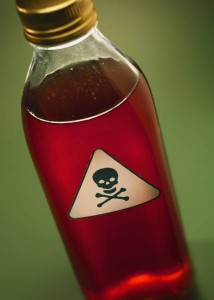The Center for Poison Control states on their website that in 2008 they had over 2.4 million calls for poisonings. Often misunderstood, a poison is ANY substance that enters the body and causes harm or illness. A Tylenol that a child eats, rat bait, wasp stings and alcohol are all considered poisons. This article will discuss some common poisons and how to find treatment if it enters your body.
Poisons can enter your body through four paths: inhalation, injection, absorption and swallowing.
Inhaled Poisons

- glue
- paint
- chlorine
- carbon dioxide
- tobacco
Injected Poisons
This type of poison enters the body through a puncture in the skin. Like inhaled poisonings, poison that has been injected into the body can be done accidentally as well as intentionally. These poisonings often create the quickest reactions because they are commonly injected directly into the blood stream. Here is a list of poisons that can be injected:
- Animal bites (snakes, spiders etc.)
- Any liquid entering the body through a hypodermic needle
Absorbed Poisons
Poisons can be absorbed into the body through the pores in your skin. Absorbed poisons can come from the following:
- Plants
- Fertilizers
- Animal control substances
Swallowed Poisons
This is the most common type of poisoning and is described as any substance that enters your body via the mouth that causes harm or illness. This category is extremely broad since practically everything in this world can be eaten or swallowed. Examples include medication, cleaning materials and alcohol. Here is a list of commonly swallowed poisons:
- bleach
- pills
- chewing tobacco
- beer
Signs and Symptoms
It is often difficult to determine whether someone has been poisoned or not. However, the list of signs and symptoms is ongoing. Here are a few things to look for if you suspect someone has been poisoned:
- difficulty breathing
- watery eyes
- swollen face
- diarrhea
- seizures
- chest pain
- unconsciousness
IF ANY LIFETHREATENING SYMPTOMS OCCUR SUCH AS DIFFICULTY BREATHING, BLEEDING ETC. CALL 911
What to do if it’s not life threatening?
The first thing you should do is call the National Poison Control System at 1-800-222-1222. It is helpful to know what the name of the poison is, how long ago it entered the body and how much was swallowed, injected, inhaled or absorbed.
More articles related:
